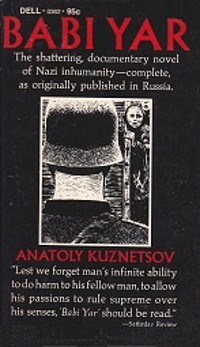Status
Call number
Genres
Collections
Publication
Description
At the age of twelve, Anatoly Kuznetsov experienced the Nazi invasion of Ukraine, and soon began keeping a diary of the brutal occupation of Kiev that followed. Years later, he combined those notebooks with other survivors' memories to create a classic work of documentary witness in the form of a novel. When Babi Yar was first published in a Soviet magazine in 1966, it became a literary sensation, not least for its powerful and unprecedented narratives of the Nazi massacre of the city's Jews, and later Roma, prisoners of war, and other victims, at the Babi Yar ravine--one of the largest mass killings of the Holocaust. After Kuznetsov defected to Great Britain in 1969, he republished the book in a new edition that included extensive passages censored by the Soviets, along with his later reflections.… (more)
Subjects
Awards
Language
User reviews
Although the story centers around the September 1941 mass murder of some 33,000 Jews at Babi Yar, a ravine outside Kiev, that's not all this story is. Kuznetsov's writing encompasses far more than that, and you really get a feel of what life must be like in a war-ravaged city. His description of the destruction of the Kreshchatik (the oldest and most beautiful section of Kiev) made me think of how New York City must have been like after 9-11 -- except the Kreshchatik bombings were a lot worse. In his list of "the number of times I should have been shot," Kuznetsov shows that all the inhabitants of Kiev (not just the Jews or soldiers or political activists or partisans, but EVERYONE) had to risk their lives every day, and how many lost their lives simply by being there. He includes printings of actual primary source documents such as memos, reports, handbills etc., from this time period as well as his own writings.
Most intriguingly: Babi Yar was initially published in Russia during the 1960s. I'm surprised it was published at all, as it was very critical of the Soviet regime. In any case the Soviet censors redacted large parts of it. When Kuznetsov defected to England, he took the original manuscript with him on microfilm, and added parts to it before publishing it in full in the West. The original Soviet text is in regular type, the parts the Soviet censors cut out are in boldface, and the parts Kuznetsov added after his arrival in England are in brackets. It's interesting to see what was taken out and what was allowed -- they made some surprising choices.
I really cannot recommend this book highly enough, for Holocaust scholars and World War II scholars alike.
No less memorable is the fact that, for decades after the war, the Soviet regime refused to
The author did not directly witness the atrocities at Babi Yar, although he and other residents of Kiev heard the constant sound of gunfire, day after day. He does, however, include what he says are close to verbatim accounts by some of those who narrowly escaped death at Babi Yar. The author himself, although not a Jew, frequently had to dodge deportation to Germany to work in the factories, and daily faced starvation.
I had long heard of this book, and expected a lot more from it than I got, perhaps because there have been so many more personal accounts of surviving the Holocaust that were published after Babi Yar. Babi Yar was important at the time it was published, because it was one of the first, if not the first, open admission by the Soviets that these events occurred. This book, along with Yevtushenko's moving poem opened the dialogue in the Soviet Union, and the world on the massacre.
